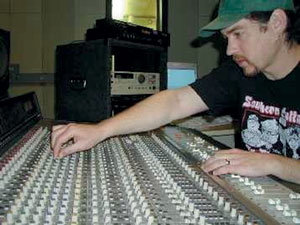| 2003 |

|
YEAR BOOK |
Dundalk Institute of Technology
|
Music Technology at Dundalk IT
|

Music Technology is a rapidly-developing area of teaching, learning, and research at Dundalk IT. A new four-year BA (Honours) programme in Applied Music (with a specialism in Music Technology) starts in September 2003 with a Masters programme in Music Technology beginning in September 2004. Core areas of study and research on these programmes include Acoustics & Psychoacoustics; Electroacoustic Music & Composition; Interactive Systems; Sound Synthesis & Manipulation; Digital Signal Processing; Music Programming; Algorithmic Composition; MIDI: Theory & Practice; Recording, Editing, and Production; Digital Audio; Technology in Music Education and Music Therapy; and Music and Multimedia. A key feature of music technology at DKIT is the strong connection between teaching and research.

A new Music Technology Centre is being designed to support these taught programmes, postgraduate research, and the work of the Music Technology Group. The Centre will also be home to a Technology in Music Education unit researching and developing the use of technology in music education.
The new Music Technology Centre at Dundalk IT will be a state-of-the art environment dedicated to teaching, learning, and research in Music Technology. Comprising fully equipped and networked computer music labs, music technology units, a recording studio, and a sonic arts performance space, it will be operational from 2004. Workstations will be a combination of Windows, MacOS, and Linux machines on a Gigabit Ethernet network.
Hardware and software tools for teaching, learning and research will include the following: sound synthesis (Csound and utilities, Reaktor); sound editing and manipulation (Wavelab, CDP); development (Max, MSP, PD, Matlab, C++, Java, PHP); multi-track recording (ProTools, CoolEdit and low-latency audio interfaces); algorithmic composition (Tabula Vigilans, Koan Pro); and gesture-tracking devices (SoundBeam, Atomic Pro). At the heart of the main recording studio will be a recently acquired Solid State Logic desk and high-end ProTools system on a Mac platform.
Music Technology Research: the Music Technology Group
Research interests of the Music Technology Group are many and varied and reflect the interdisciplinary nature of the subject - with group members from Music, Engineering, and Computing. Areas of research interest and expertise include Musical Pattern Matching; Music Programming; Technology in Music Education; Algorithmic Composition; Interactive Systems and their Musical and Therapeutic Applications; Acoustics & Psychoacoustics; Audio Circuit Design; Recording, Editing and Production; Electroacoustic Composition; and Audio Compression.
Recent and Current Research
Musical Pattern Matching - The process of pattern matching has many musical applications - e.g. melody retrieval and analysis, triggering function in live performance, gesture recognition, score tracking, music therapy. This MIDI-based project involved the development of a library of pitch, rhythm, and velocity (loudness) algorithms which can be used both singly and in combination. Variations of Boyer-Moore and other techniques were used in the pattern matching process.

Contact: Paul McGettrick, Director, Music Technology Centre, Dundalk Institute of Technology, Dublin Road, Dundalk, Co Louth;
Tel: +353 42 9370493; Fax: +353 42 9331163;
E-mail: [email protected] ; Web: www.dkit.ie/mtc